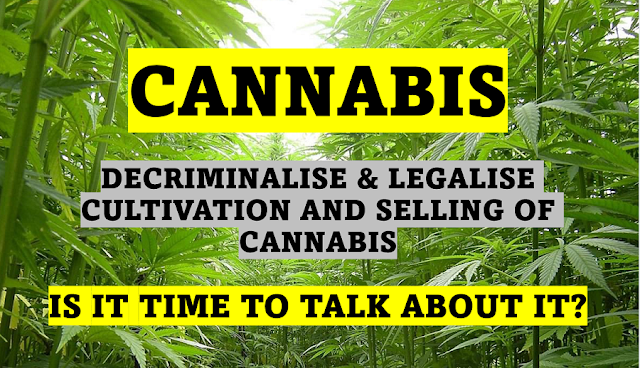Marijuana, also known as cannabis, is a drug that is derived from the Cannabis sativa plant. In recent years, there has been a growing debate on the legalisation of marijuana, with many countries around the world taking steps towards decriminalisation or full legalisation.
Papua New Guinea's (PNG) potential to grow Cannabis as a cash crop is there, but there are very few arguments for and against the legalisation of marijuana in this country. So we ask, 'Should Marijuana (Cannabis) Be Legalised in Papua New Guinea?'
Here are some arguments for and against decriminalising and or legalising the cultivation and selling of Cannabis. (Leave a comment about what you think).
Pros of Legalising Marijuana in PNG
Market Size:
Legalising marijuana in PNG could create a new market for the plant. With a population of over 8 million people, there is a potential market for both recreational and medical marijuana.
According to the United Nations Office on Drugs and Crime, Papua New Guinea is one of the largest producers of cannabis in the Asia-Pacific region, and this could be an opportunity to capitalise on that market.
Health Benefits:
Marijuana has been found to have various medicinal properties that can help in the treatment of certain conditions such as chronic pain, epilepsy, and multiple sclerosis.
Legalising marijuana would make it easier for those who need it for medical purposes to access it legally.
Revenue Generation:
Legalising marijuana in PNG could also generate revenue for the government through taxes and fees.
In states where marijuana is legal in the United States, for example, there has been a significant increase in tax revenue. This additional revenue could be used to fund various government programs, including healthcare and education.
Potential Cash Crop:
Marijuana is a high-value crop that could become a major cash crop for PNG farmers.
By legalising marijuana, local farmers could benefit from increased demand and higher prices for their crops. This could help boost the local economy and create jobs in the agricultural sector.
Cons of Legalising Marijuana in PNG
Health Risks:
While marijuana has been found to have some health benefits, it also has risks associated with its use. These include addiction, impaired cognitive function, and respiratory problems.
If marijuana is legalised in PNG, there will need to be measures put in place to mitigate these risks, such as age restrictions and quality control.
Crime and Black Market:
Legalising marijuana could also lead to an increase in crime and the black market.
Criminal organisations may continue to traffic marijuana to areas where it is still illegal or where it can be sold at a higher price. This could lead to increased violence and other criminal activities.
For example, a recent report indicated that cannabis-use data from Australia’s national organised crime-fighting agency shows that criminal groups grab $25 billion a year from cannabis in Australia. That's how much money that's circulating underground, un-taxed. Imagine taking that off organised crime and taxing it for public services.
Negative Impact on Villagers and Local Farmers:
While legalising marijuana could benefit local farmers, it could also have negative impacts on villagers and small-scale farmers.
Large corporations could move in and dominate the market, pushing out local growers and taking control of the industry.
Tourism:
While marijuana is a popular tourist attraction in some areas, legalising it in PNG could also have negative impacts on tourism. Some tourists may be put off by the idea of marijuana being legal, and it could also give the country a negative image.
Examples of Places where Marijuana is Legal
There are a number of countries and states where marijuana has been legalised or decriminalised.
In the United States, for example, marijuana has been legalised for recreational use in 15 states and the District of Columbia.
It is also legal for medical use in many other states.
Other countries that have legalised marijuana for recreational use include Canada, Uruguay, and South Africa.
Growing and Selling Marijuana
Growing and selling marijuana is a complex process that requires knowledge and expertise. Marijuana plants need specific growing conditions, including adequate light, temperature, and humidity. They also need to be fertilised and protected from pests and diseases.
Selling marijuana legally requires a license and compliance with government regulations.
Legalising Marijuana in PNG
The legalisation of marijuana in Papua New Guinea has both pros and cons. While it could create a new market, generate revenue, and have health benefits, it could also lead to health risks, crime, and negative impacts on local farmers and villagers.
If marijuana is legalised, there will need to be measures put in place to ensure that the industry is regulated and that the risks are mitigated.
One potential solution could be to follow the examples of countries and states where marijuana has already been legalised. The government could create regulations to control the production, sale, and distribution of marijuana, while also putting in place measures to protect public health and safety. This could include age restrictions, quality control, and licensing requirements.
In addition, the government could work with local farmers and communities to ensure that they benefit from the legalisation of marijuana. This could include providing education and training on growing and selling marijuana, as well as creating opportunities for local farmers to sell their crops legally.
Conclusion
Overall, the decision to legalise marijuana in Papua New Guinea is a complex issue that requires careful consideration of both the benefits and the risks.
With the right policies and regulations in place, however, it is possible that the legalisation of marijuana could be a positive development for the country, creating new opportunities for economic growth and public health.




